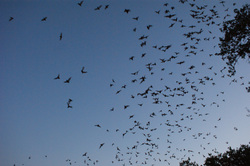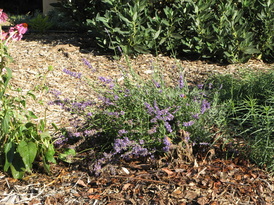
Every so often one finds great inspiration from the smallest of events. Today, I came across two; a years old magazine and a website I did not know. Both gave me pause, but then spurred me to think.
First, I stumbled over a Tricycle magazine from 2009 as I cleaned my studio. I happened to open the magazine to “Out of the Skeleton Garden: On things that go flap in the night” by my favorite garden author, Wendy Johnson. In it she rejoiced that we have bats in the world, for pest control, pollination, and fertilizer. She eloquently described the important niche bats inhabit, and how each small bat action influences the well being of a myriad of plants, animals, and people around them. This led me to think of Throop Learning Garden, and the joy of seeing swooping bats at dusk. We are so fortunate to have them as denizens of our extended community.
First, I stumbled over a Tricycle magazine from 2009 as I cleaned my studio. I happened to open the magazine to “Out of the Skeleton Garden: On things that go flap in the night” by my favorite garden author, Wendy Johnson. In it she rejoiced that we have bats in the world, for pest control, pollination, and fertilizer. She eloquently described the important niche bats inhabit, and how each small bat action influences the well being of a myriad of plants, animals, and people around them. This led me to think of Throop Learning Garden, and the joy of seeing swooping bats at dusk. We are so fortunate to have them as denizens of our extended community.
The second happenstance involved a small UK website: myclimatechangegarden.com.
The very short article entitled “How Your Garden Can Help Beat Climate Change” offered four areas where urban gardens make a difference:
I would add a number of other benefits including: building community, providing food, and promoting a deeper sense of interbeing.
Both inspirations dovetail into our activities at Throop Learning Garden. We are in the process of setting up workshops for the fall/winter season. One of our key topics is attracting bats to gardens. This also ties in with our goal of promoting gardening across the city. Several regular gardeners are joining with other folks to form gardens for the Arroyo Food Co-op and a Woodbury neighborhood group. Each action draws us into a larger, interconnected web of life. Each small step brings us closer to healing ourselves and our environment.
— January Nordman
The very short article entitled “How Your Garden Can Help Beat Climate Change” offered four areas where urban gardens make a difference:
- [Gardens] help control urban temperatures, mitigating the effects of extreme heat or cold.
- They help prevent flooding by absorbing rainwater that would otherwise overload a drainage system.
- They have effectively become some of Britain’s best nature reserves, supporting a range of wildlife including birds, mammals, and invertebrates.
- They support human health by easing stress and providing physical exercise.
I would add a number of other benefits including: building community, providing food, and promoting a deeper sense of interbeing.
Both inspirations dovetail into our activities at Throop Learning Garden. We are in the process of setting up workshops for the fall/winter season. One of our key topics is attracting bats to gardens. This also ties in with our goal of promoting gardening across the city. Several regular gardeners are joining with other folks to form gardens for the Arroyo Food Co-op and a Woodbury neighborhood group. Each action draws us into a larger, interconnected web of life. Each small step brings us closer to healing ourselves and our environment.
— January Nordman





